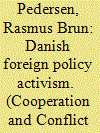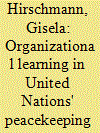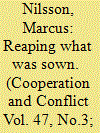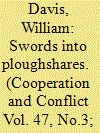| Srl | Item |
| 1 |
ID:
115271


|
|
|
|
|
| Publication |
2012.
|
| Summary/Abstract |
Danish foreign policy is under transformation. Different versions of activism have gradually replaced adaptation and lately Denmark has participated more actively and independently in world politics than ever before. The core in activism is based on a liberal value system that seems to have replaced the adaptation logics dominating Danish foreign policy during the Cold War. Activism has evolved from a multilateral inspired activism in the 1990s to a more Atlantic centred activism during the 2000s. While analysts see the different phases as opposites, my argument is that the types of activism should be seen as a difference of degree rather than a difference of kind. 'Activism' as a foreign policy strategy, however, should be considered analytically as a difference in kind from the adaptation strategies that dominated Danish foreign policy during the Cold War. The main driving force behind this transformation can be found domestically in the Liberal Party's dominant position in Danish politics.
|
|
|
|
|
|
|
|
|
|
|
|
|
|
|
|
| 2 |
ID:
115274


|
|
|
|
|
| Publication |
2012.
|
| Summary/Abstract |
Truth and reconciliation commissions (TRCs) have emerged as an international norm and are assumed to be an essential element of national reconciliation, democratization, and post-conflict development. Despite the increase in the number of TRCs being initiated around the globe and the international consensus regarding their positive effects, there is little understanding of the long-term effects and consequences of TRCs. Specifically, currently there are no established methods or mechanisms for measuring the impacts of TRCs; furthermore, the few examples of efforts to measure these impacts have serious limitations. This article explores both the rise in TRCs as an international norm and the contradictions and inadequacies in existing efforts to measure the impacts and successes of commissions. Through this examination, we aim to demonstrate the need for more critical, interactive, and inclusive mechanisms of assessment for understanding the effects of TRCs. The objective is neither to promote nor to criticize a specific TRC or TRCs in general; however, this article emphasizes the need to think rigorously about how we assess the effects of TRCs and offers insights into the value of more comprehensive mechanisms for assessing the impacts and local perceptions of commissions.
|
|
|
|
|
|
|
|
|
|
|
|
|
|
|
|
| 3 |
ID:
115273


|
|
|
|
|
| Publication |
2012.
|
| Summary/Abstract |
This article illustrates how organizational learning can explain the shift in United Nations' peacekeeping exit strategies from the election-based approach of the 1990s to peacebuilding. Conceptualizing learning as an ideal-type, three-step process, of knowledge acquisition, interpretation and institutionalization, the analysis reveals the impact of new knowledge on institutional change. It demonstrates how knowledge acquisition became systematized within the United Nations' Secretariat especially after 2000, with the active promotion of boundary-spanning activities. The analysis then shows how a shared understanding of the role of peacebuilding for exit strategies was developed by the organization's bureaucracy and intergovernmental bodies in the interpretation step. Finally, it highlights how the establishment of the Peacebuilding Commission institutionalized the transition to peacebuilding as the new exit strategy and how new learning capacities were created. By conceiving the interaction between international organizations and their external environment as a dynamic relationship, the analysis confirms the potential of organizational learning theories for explaining institutional change in international relations.
|
|
|
|
|
|
|
|
|
|
|
|
|
|
|
|
| 4 |
ID:
115272


|
|
|
|
|
| Publication |
2012.
|
| Summary/Abstract |
What impact does the way a civil war is terminated have on the post-conflict democratization process? This study analyses whether certain types of conflict termination are positive for post-conflict levels of democracy. It is argued that negotiated settlements, being at large more cooperative, are more conducive for democratization than truces or military victories. Stabilizing measures rarely leave possibilities for contestation of elites and thus few incentives to open up post-war society. The empirics reveal that negotiated settlements are the best way to end a conflict if democracy is to develop in its aftermath.
|
|
|
|
|
|
|
|
|
|
|
|
|
|
|
|
| 5 |
ID:
115269


|
|
|
|
|
| Publication |
2012.
|
| Summary/Abstract |
This article seeks to unpack the implications of technocracy for contemporary peace-building. It aims to illustrate how the bureaucratic imperative explains much about the ascendancy of certain actors to positions of prominence on the peace-building landscape, and the types of activities that these actors engage in. In line with world polity theory, it is interested in the construction and institutionalization of discourses, understandings, expectations and practices of peace-building. It argues that there has been a 'technocratic turn' in relation to peace-building, whereby there has been a gradual but persistent trend towards the application of technocracy in the framing of conflict and approaches to it. Two key claims advanced on behalf of technocracy - neutrality and efficiency - are discussed. The article then argues that a complex mix of structural and proximate factors have reinforced the technocratic turn in peace-building. It concludes by considering the extent to which the discursive framing of conflict by key actors predetermines their conflict response. The article is primarily an exercise in conceptual scoping, though it can also be read as a contribution to the critique of the liberal peace and considerations of resistance and agency in peace-building contexts.
|
|
|
|
|
|
|
|
|
|
|
|
|
|
|
|
| 6 |
ID:
115270


|
|
|
|
|
| Publication |
2012.
|
| Summary/Abstract |
This analysis focuses on the effects of domestic public pacifist opinion and international security threats on foreign policy outputs. Much work has suggested that governments' foreign policy outputs are responsive to public opinion in advanced democratic countries. Using the cases of several Western democracies, this article offers a theory of the effect of public pacifism on foreign policy. It employs a cross-sectional time-series analysis over a period of a quarter century to test the theory and the generalizability of the hypothesis of an opinion-foreign policy nexus using new measures and broader data. Results here contradict literature on expected public opinion and policy outputs in the Cold War period, yet are supported after. The findings indicate that the predicted effect of public opinion on foreign policy outputs to be conditional on the presence of security threats. Convergence between leaders and public opinion in post-Cold War Western democracies is likely to make hawkish foreign policy less tenable in the West.
|
|
|
|
|
|
|
|
|
|
|
|
|
|
|
|